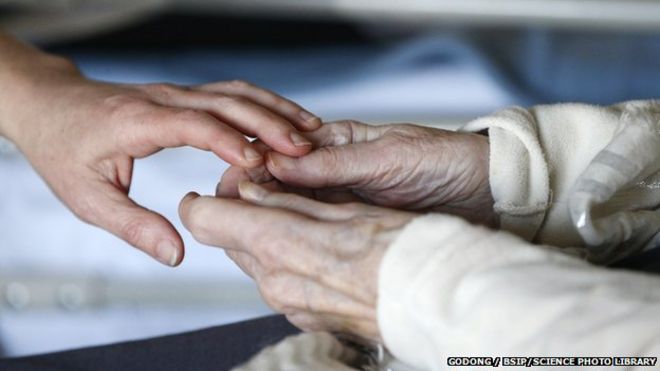
Thousands of dying patients are being let down by poor end-of-life care provision, the organisation that makes final decisions about NHS complaints in England has said.
The health ombudsman's report detailed "tragic" cases where people's suffering could have been avoided or lessened.
In one instance, a patient had suffered 14 painful attempts to have a drip reinserted during his final hours.
The government said improving end-of-life care was a priority.
The Parliamentary and Health Service Ombudsman has investigated 265 complaints about end-of-life care in the past four years, upholding just over half of them.
Catalogue of failings
Its Dying Without Dignity report said it had found too many instances of poor communication, along with poor pain management and inadequate out-of-hours services.
One mother told the ombudsman how she had had to call an A&E doctor to come and give her son more pain relief because staff on the palliative care ward he had been on had failed to respond to their requests.
In another case, a 67-year-old man's family learned of his terminal cancer diagnosis through a hospital note - before he knew himself. This "failed every principle of established good practice in breaking bad news", the report said.
"There was an avoidable delay in making a diagnosis," it added. "An earlier diagnosis would have meant opportunities for better palliative care."
Ombudsman Julie Mellor told Radio 4's Today the report made "very harrowing reading".
She also urged the NHS to learn lessons from the report, adding: "Our casework shows that too many people are dying without dignity.
"Our investigations have found that patients have spent their last days in unnecessary pain, people have wrongly been denied their wish to die at home, and that poor communication between NHS staff and families has meant that people were unable to say goodbye to their loved ones."
'Appalling cases'
Macmillan Cancer Support chief executive Lynda Thomas said: "The report cites heartbreaking examples of a lack of choice at the end of life that are totally unacceptable.
"If we are to improve the current situation, we will have to see a dramatic improvement in co-ordination of care, and greater integration of health and social care."
The chief inspector of hospitals at the Care Quality Commission, Prof Sir Mike Richards, said the organisation had seen examples of excellent end-of-life care, but also instances where it had not been given enough priority.
He said the CQC would continue to highlight those services that were failing.
A Department of Health spokesman said: "These are appalling cases - everyone deserves good quality care at the end of their lives.
"The five priorities for end-of-life care we brought in emphasise that doctors and nurses must involve patients and their families in decisions about their care, regularly review their treatment and share patients' choices to make sure their wishes are respected.
"NHS England is working on making these priorities a reality for everyone who needs end-of-life care."











